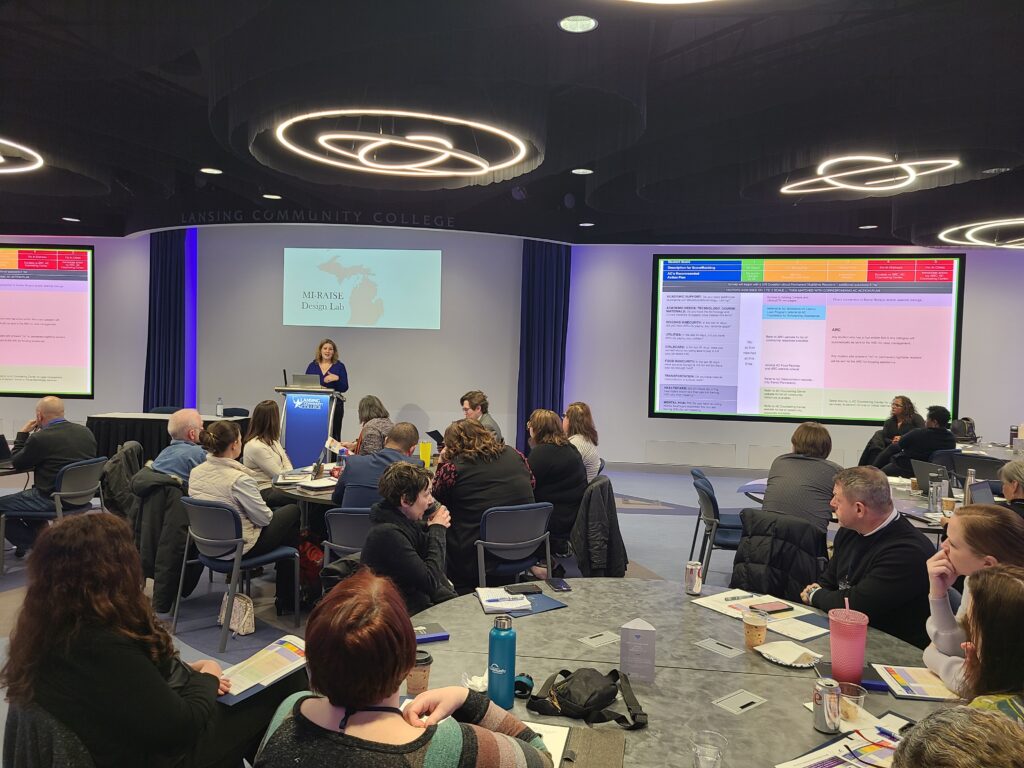Reflecting on a year fraught with historic challenges, it can be easy to overlook progress. Talent 2025’s CEO leaders and partners in education and workforce development persevered through the pandemic to achieve success on multiple fronts.
It is important to recognize these accomplishments, and to see them for what they are: advances in our mission to catalyze an aligned talent system, and the foundation to extend our progress into (a more normal) 2021 and beyond.
In fact, the pandemic has only amplified the importance of our work to ensure a world-class talent supply for West Michigan.
As COVID-19 reshaped our world, these disruptions provided a real-time view of what happens when skills and education do not meet sudden changes in the workplace and shifts in industry.
From record low unemployment of 2.5 percent in early March, West Michigan’s unemployment rate in April hit a historic high of 23 percent. By July, job growth returned and outpaced the state and nation, with October unemployment declining to 4 percent. Although nearly all industries showed evidence of recovery, total regional job counts remain 40,500 (-6.5%) below historic highs recorded in the first half of March.
Talent 2025 sees several notable implications for West Michigan, including:
- The accelerated and permanent loss of many low-skill, low-wage jobs means new strategies and partnerships will be needed to help the people who lost these jobs upskill to get better jobs, often in other industries.
- The transformation of the workplace, with increased use of remote work, automation, and AI, created a greater expectation of digital skills for all workers and new protocols for employers and employees.
- While employment has rebounded, pockets of higher unemployment emerged among people of color and low-skill workers. This presents an opportunity for employers to invest in strategies to attract, develop, and retain this talent.
Such significant disruptions complicate our efforts to grow the supply of skilled and educated talent.
Fortunately, Talent 2025 is built to address these challenges, by taking a data- and research-driven approach, and convening leaders in business, education, and workforce development to address the region’s talent needs and challenges together. Over the past year, this collaboration resulted in multiple accomplishments worth noting.
Accomplishments in 2020
Labor Market Insight
Led by Jay Dunwell (Wolverine Coil Spring Co.), Mark Lancaster (EG Workforce Solutions), Benjamin Wickstrom (Erhardt Construction).
- Analyzed the impact of COVID-19 on various sectors of our economy, identifying which demographics and industries were hardest-hit, along with long-term implications from the accelerated shift to remote work, automation and AI.
- Published seven recommendations to improve how Michigan measures the effectiveness of education and workforce programs over time. These proposals have gained broad support among Michigan policy makers. Implementation is expected in 2021.
Workforce Diversity & Inclusion
Led by Win Irwin (Irwin Seating Company), Larry Murphy (Varnum Law), Dale Nesbary (Muskegon Community College), Kent Riddle (Mary Free Bed).
- CEOs from more than 80 companies have committed to improve diversity and inclusion. This is up from 55 in 2019.
- Published an op-ed in the Grand Rapids Business Journal, calling for West Michigan employers to unite as champions for diversity and inclusion.
- Launched a CEO Roundtable with 12 members to share challenges and successes as champions for D&I within their organizations.
- See an overview of accomplishments in this video.
Early Childhood Development
Led by Lew Chamberlin (Whitecaps Professional Baseball), Bruce Los (softArchitecture), Bridgett VanDerHoff (Gilden Woods/Appletree), Sean Welsh (PNC Bank) John Wilson (Western Land Services, Inc.)
- Successfully advocated for an increase in the eligibility threshold for subsidized child care so more low-income working families qualify.
- Based on our previous work, including the Child Care Provider Survey, immediately identified child care as a significant casualty of the pandemic. Published a guide to child care resources for essential workers.
- Helped State Representative Jack O’Malley draft legislation to reform regulations, streamline oversight, and increase the reimbursement rate to help child care stay open.
Higher Education
Led by Brad Thomas (Progressive AE), Bob Roth (RoMan Manufacturing)
- Successfully advocated for including greater accountability for community colleges in the Michigan Reconnect Grant Program legislation, which will provide grants and scholarships to low-skill adults seeking a post-secondary education.
- Launched DiscoverEducation@Work, a workplace-based introduction to the advantages of post-secondary education. This short video series, which can be integrated into employee training programs, is targeted at employees whose children are less likely to enroll in post-secondary education or training.
K12 Education
Remote vs. In-School Learning
- Worked at the beginning of the pandemic to help school leaders and providers address gaps in access to technology and high-speed internet required for remote learning.
- Raised awareness of the cost of losing in-person learning, and the grave consequences for a generation of students, especially those already at risk of falling behind. At our fall CEO Conference, we heard from Dr. Rosemary Olivero from Helen DeVos Children’s Hospital, and David Stuit from Basis Policy Research, who outlined the epidemiological, academic and social arguments for returning to in-person learning as soon as possible.
Reading by Third Grade
Led by Leslie Brown (Metal Flow), John Kennedy (Autocam Medical), Jim Brooks (Liv Communities)
- West Michigan’s Reading Now Network brought expectations that improvement would be seen among many low performing schools, but the cancellation of the third-grade reading assessment this spring meant any improvement couldn’t be quantified.
College and Career Readiness
Led by Jon DeWys (DeWys Manufacturing), Ryan Bryker (Rehmann), Jay Dunwell (Wolverine Coil Spring), Mark Lancaster (EG Workforce Solutions)
- Led the effort to scale the Mavin platform, an exciting new strategy to help middle and high school students explore careers and build workplace skills during the pandemic and beyond. Mavin now boasts more than 200,000 students, 100 school districts, and 300 participating employers. See an overview in this video.
Workforce Development
Human Resource Leaders
Led by Amy Kraal (HR Solutions) and Bruce Los (softArchitecture)
- Brought together HR leaders to share what solutions were working as they adjusted safety protocols, anticipated work slowdowns, preserved their workforce amidst the spring slowdown, then brought back employees as economic activity resumed in the summer.
Adult Education
Led by Bob Von Kaenel (Kentwood Office Furniture) and Mike Byam (Terryberry)
- Highlighted the failures of Michigan’s adult education system, especially in the wake of pandemic-related job losses concentrated in low-skill, low-wage fields.
- Advocated to competitively bid grants for adult ed providers, require the integration of occupational training with adult education, raise performance standards and align state and federal requirements.
Returning Citizens
Led by Mike Dykstra (Zeeland Lumber & Supply) and Jason Kerr (Valley City Recycling).
- Successfully worked with the Michigan Department of Corrections and Secretary of State to ensure the 9,000 parolees who leave prison every year have a state ID, a vital document for employment, housing and returning to civic life. This video explains the significance of this in more detail.
- Advocated in support of passing the Clean Slate legislation, which automated the expungement process for eligible convictions. Michigan is the third state to adopt Clean Slate legislation and its policy is the broadest to date: It is the first state to include felonies within its eligibility and the first to refrain from disqualifying otherwise eligible individuals who have unpaid legal debt.
Looking Forward to 2021
This summary of accomplishments is a reminder that progress is possible under difficult circumstances. It also reaffirms the unique value of Talent 2025 – bringing together business, education, and workforce leaders to address persistent and emerging workforce needs.
While West Michigan stands at the top among 12 peer communities nationally in six key performance indicators, a lot of work remains to be among the top 20 nationally. The talent landscape reshaped by COVID-19 will require new strategies to make that leap. But as we demonstrated during one of the most difficult years in a generation, West Michigan is up for the challenge.
{{cta(‘be643ac7-73e2-40f6-a7b2-7c5927924bf4′,’justifycenter’)}}


